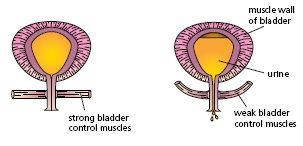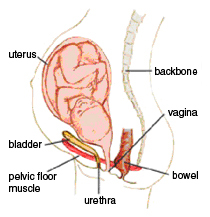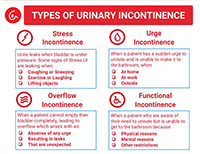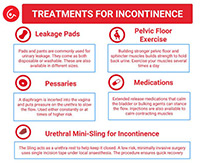Urinary Incontinence
Urodynamics - Urodynamics testing is used to assess and diagnose the cause of many common bladder problems, including incontinence.

Are you suffering from accidental, involuntary flow of urine from your body? While this issue can be embarrassing, it's very common and can be treated.
What causes urinary incontinence?
There are many reasons why a woman may leak urine. Sometimes it's caused by an illness, in which case bladder control returns when the illness goes away. For example, bladder infections and infections in the vagina can cause incontinence for a short time. Being unable to have a bowel movement or taking certain medicines also may make it hard to control your bladder.
Sometimes incontinence is an ongoing problem, in which case the cause might be:
- The bladder cannot empty completely
- Weakening of the muscles that help to hold or release urine
- A blocked urinary passage
- Damage to the nerves that control the bladder
Sometimes, diseases such as arthritis make it hard to get to the bathroom in time and can make it even harder to control urine leakage.

How common is urinary incontinence?
More than 13 million Americans - male and female, young and old - have incontinence. Women are more likely to leak urine than men.
Older women have more bladder control problems than younger women. But loss of bladder control does not have to happen as you age. If you're leaking urine, talk to your doctor about it. Your doctor can help you. For more information on talking to your doctor about urinary incontinence, see “How do I talk to my doctor about urinary incontinence?”
Does having a baby cause urinary incontinence?
Yes. It can, but don't panic. If you lose bladder control after having a baby, the problem often goes away by itself. Your muscles may just need time to recover.
Being pregnant also can cause leakage due to:

- Pressure of the pregnancy on the bladder and pelvic muscles
- Vaginal delivery
- Episiotomy (the cut in the muscle that makes it easier for the baby to come out)
- Damage to bladder control nerves
If you still have bladder problems six weeks after having your baby, talk to your doctor. Without treatment, lost bladder control can become a long-term problem. Leaking can also result from some medical conditions, including neurologic injury, birth defects, strokes, multiple sclerosis, and physical problems associated with aging.
Sometimes bladder control problems show up years after you've had your baby. Some women do not have problems until later, often in their 40's.
Unborn babies push down on the bladder, urethra (tube that you urinate from) and pelvic muscles.
Does menopause affect urinary incontinence?
Yes. Some women have bladder control problems after they stop having periods (called menopause or change of life). After your periods end, your body stops making the female hormone oestrogen (ES-truh-jun). Some experts think this loss of oestrogen weakens the vaginal tissue.
If you're leaking urine, talk to your doctor about it. Your doctor can help you. For more information on talking to your doctor about urinary incontinence, see “How do I talk to my doctor about urinary incontinence?”
Symptoms
Urinary incontinence can affect patients differently. You may be experiencing loss of bladder control, a sudden urge to urinate or an overactive bladder. There are three main types of incontinence:
- Stress urinary incontinence usually occurs due to weakened or damaged pelvic floor muscles. This could be as a result of pregnancy, childbirth, previous pelvic surgery, aging or obesity. You may experience loss of bladder control when you place stress on your bladder, especially when coughing, sneezing, lifting heavy things or laughing.
- Urge incontinence is the consequence of overactive muscles that contract too often around the bladder. You may feel a sudden, intense urge to urinate.
- Mixed incontinence can include a combination of the symptoms above.
If the symptoms begin to affect your daily activities, it's time to seek help from an expert.
Is there anything I can do to prevent urinary incontinence?
Yes. Exercising your pelvic floor muscles regularly can help prevent bladder problems. These exercises are called Kegels.
How to do Kegel exercises:
- It may be easier to begin practicing these exercises while lying down.
- Squeeze the muscles in your genital area as if you were trying to stop the flow of urine or trying to stop from passing gas. Try not to squeeze the muscles in your belly or legs at the same time.
- Relax. Squeeze the muscles again and hold for 3 seconds. Then relax for 3 seconds. Do these 8 more times. Work up to 5 sets of 10.
- When your muscles get stronger, do your exercises sitting or standing. You can do these exercises any time, while sitting at your desk, in the car, waiting in line, doing the dishes, etc.
Be patient. It may take 3 to 6 weeks before you see results.
If you're not sure you're doing Kegel exercises right, ask your doctor or nurse to check you while you try to do them. If you aren't squeezing the right muscles, your doctor or nurse can teach you the right way to do the exercises. A pelvic floor physical therapist may be available in your area to help teach you how to strengthen these muscles or help you with other treatments.
Treatments
Dr Omar Gailani is committed to understanding the cause of your incontinence and will provide treatment options. Initial tests will help him determine the treatment most suitable for you.










